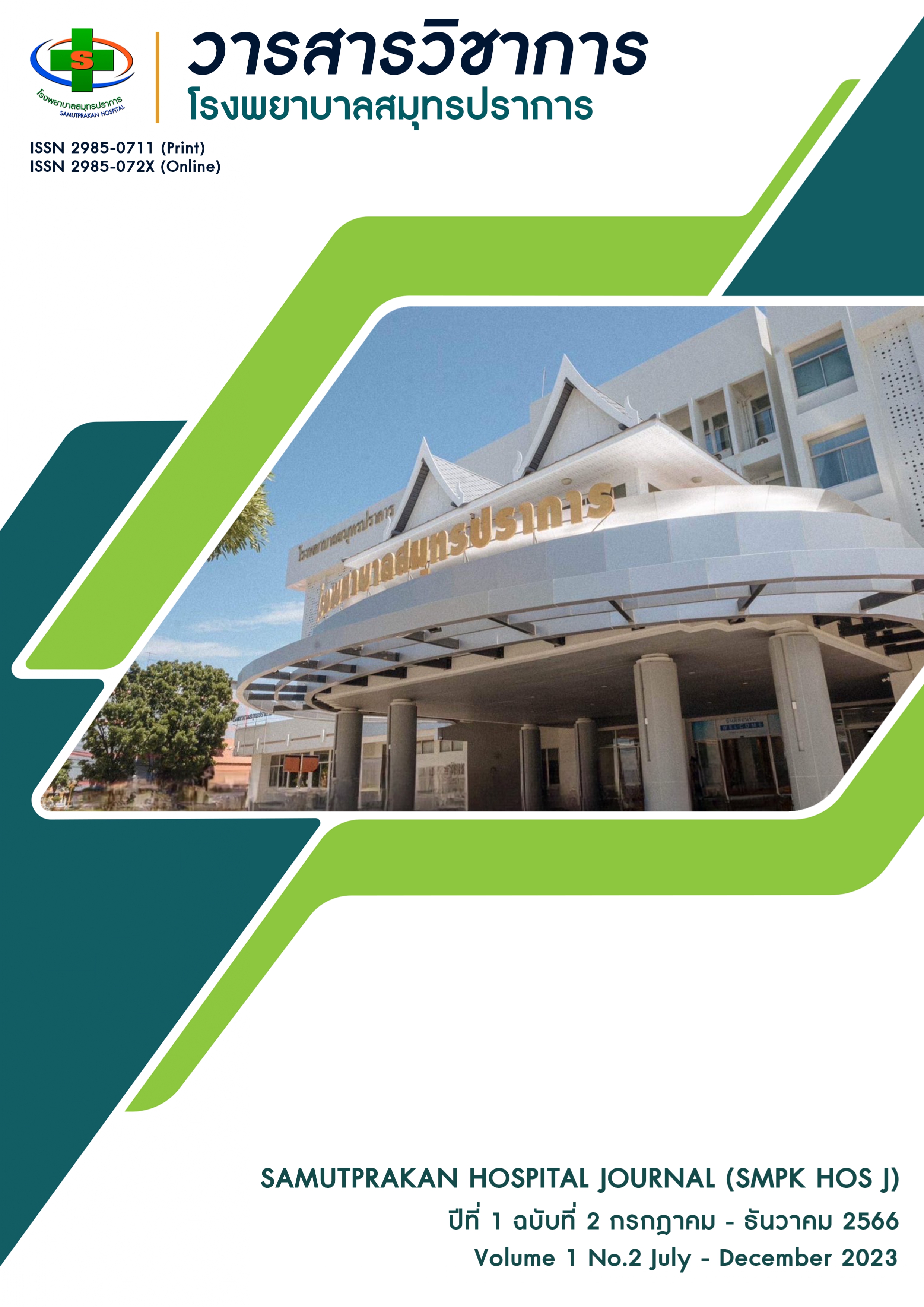Effects of Thalassemia Knowledge Promotion Program for Caregivers of Pediatric Patients in Samutprakan Hospital
Keywords:
Thalassemia, Thalassemia patients, Thalassemia knowledge, Patient care, Satisfaction, Knowledge promotion program, CaregiverAbstract
This study is preliminary experimental research, comparing a single group of pre-posttest design with the objectives to 1) compare the knowledge of caregivers of pediatric patients before and after promoting the thalassemia knowledge program 2) assess the knowledge of caregivers of thalassemia patients care and 3) assess the satisfaction of thalassemia knowledge promotion program for caregivers. The sample group was included by purposive sampling which were 20 caregivers of thalassemia patients aged between 2-15 years old. The questionnaire was used as a tool and validated by 3 experts, consisting of personal information, knowledge of thalassemia disease, knowledge of thalassemia patient care, and satisfaction with the promotion program. Descriptive statistics and paired t-tests were used for data analysis.
The results found that the sample had an average score of knowledge before promoting the program equal to 8.85 out of 15 points and after promoting the program equal to 13.15 out of 15 points which is a statistically significant increase (p=0.001). For the knowledge of thalassemia patient care, most of the sample continuously provide folic acid to patients (95%), and ask for advice from doctors, nurses, or experts in taking care of thalassemia patients (75%). However, 60% of the sample gave patients inappropriate food with high iron. The overall satisfaction of caregivers after receiving the program was high (=4.55).
References
ศิริยุพา สนั่นเรืองศักดิ์, นฤมล ธีระรังสิกุล, พจนารถ สารพัด, มณีพร ภิญโญ. รูปแบบการจัดการตนเองของเด็กที่ป่วยด้วยโรคธาลัสซีเมีย. ชลบุรี: มหาวิทยาลัยบูรพา; 2020
กรมการแพทย์. “โรคโลหิตจางธาลัสซีเมีย” โรคทางพันธุกรรมที่น่าเป็นห่วงในประเทศไทย. สำนักสารนิเทศ สำนักงานปลัดกระทรวงสาธารณสุข [อินเทอร์เน็ต]. ;2561 เข้าถึงได้จาก: https://pr.moph.go.th/?url=pr/detail/all/02/116500
Kuttarasang R, Sananreangsak S, Teerarungsikul N. Effect of family management promotion program on maternal management and health status of school-age children with Thalassemia. Thai Journal of Nursing. 2017.66(3):1-10. [In Thai].
Pitchalard K, Moonpanane K. Improvement of a continuing care model in child with Thalassemia and caregivers. Nursing Journal, 2013;40(3):97-108. [In Thai].
Viprekasit V. Comprehensive management for Thalassemia. Journal of Hematology Transfusion Medicine, 2013. 23(4), 303-320. [In Thai]
Sanee A. Self-management program in chronic diseases. Journal of The Thai Army Nurses, 2014. 15(2), 129-134. [In Thai].
เกศมณี มูลปานันท์, ขนิษฐา พิศฉลาด. ผลของโปรแกรมส่งเสริมสมรรถนะแห่งตนต่อพฤติกรรมส่งเสริมสุขภาพของผู้ป่วยเด็กวันเรียนโรคธาลัสซีเมีย. เชียงราย: มหาวิทยาลัยแม่ฟ้าหลวง; 2553.
Bandura A. Social Learning Theory. New Jersey: Englewood Cliffs; 1997.
Good CV. Dictionary of Education. New York: McGraw-Hill. (1973).
Bloom BS, et al. Hand book on Formative and Summative Evaluation of Student Learning. New York: Mc Graw-Hill Book Company. (1971)
ภูษณิศา มาพิลูน. ผลของโปรแกรมการพัฒนาความสามารถในการดูแลตนเองของเด็กวัยเรียนโรคธาลัสซีเมีย และความสามารถในการดูแลเด็กของผู้ดูแลต่อพฤติกรรมการดูแลตนเองของเด็ก. วารสารสภาการพยาบาล. 2016; 31(2):52-68.
Downloads
Published
How to Cite
Issue
Section
License
Copyright (c) 2023 Samutprakan Hospital Journal (SMPK HOS J)

This work is licensed under a Creative Commons Attribution-NonCommercial-NoDerivatives 4.0 International License.







